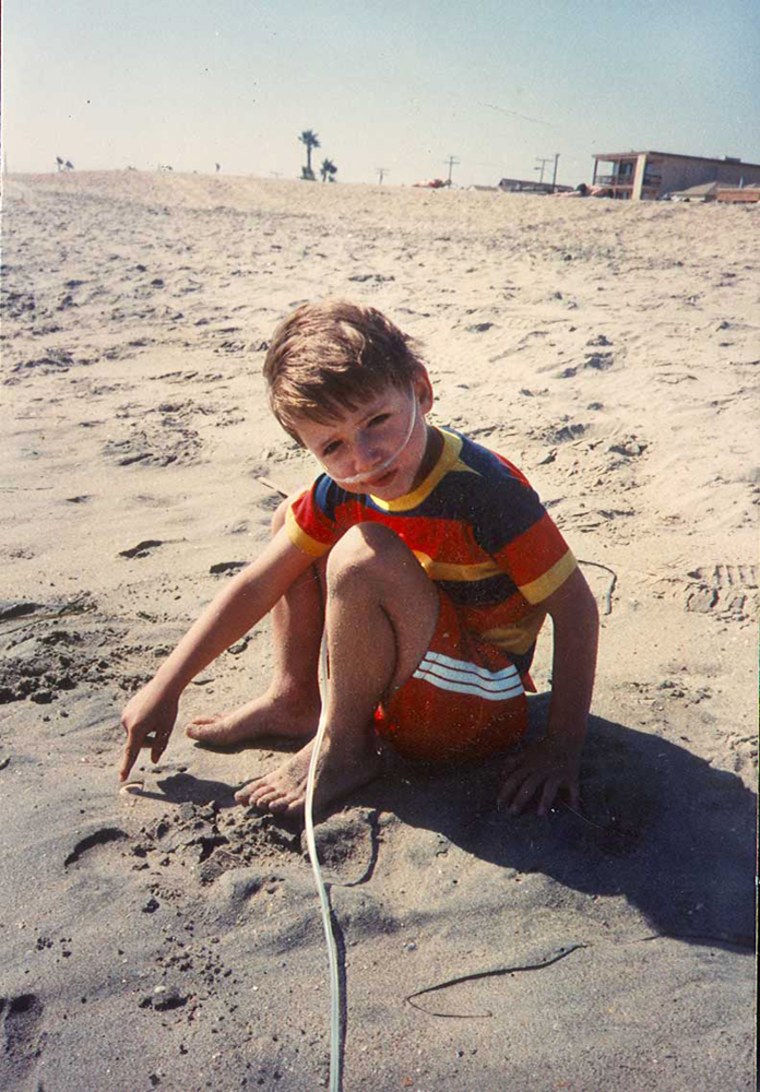He arrived in this world six weeks premature, on March 19, 1983 and he wasn’t destined to stay for very long. They named him Jonathan. Jonathan Swain.
No one knew then, no one had a clue, that such a little bundle would produce such an amazing, remarkable story; begun in disaster, buffeted by betrayals, and pushed to a conclusion which any fool would tell you must surely be impossible.
All they knew then was that the little bundle was in very big trouble.
Sheila Swain, Jonathan’s mother: They said, “This baby shouldn’t even be living, let alone bouncing up and down,” you know, he had a lot of energy. He was a fighter.
Jon’s mom, Sheila Swain, remembers how her son needed several blood transfusions to keep his tiny 4-lbs. body going, and how, even when he finally went home, he was far from healthy.
Sheila Swain: I kept asking the doctor: "What’s wrong with my baby? How come he’s always sick?"
For two years doctors didn’t have an answer. Finally, after a bout with pneumonia that almost killed Jon, a specialist ordered a series of painful invasive biopsies.
And then in June 1985, a couple of months after Jon turned 2 years old, came that phone call from the doctor.
Sheila Swain: And my heart just went out of my body. Like “Oh my God, no.” And he just kept saying, "I’m so sorry. I’m so, so sorry"
The doctor told Sheila that Jonathan had AIDS. One of the blood transfusions he received when he was just a couple of days old contained blood tainted with HIV. Jonathan became the first child in Colorado, one of the first in the U.S. to contract the disease, And this is the mid-‘80s, medical research into AIDS was in its infancy, treatments were virtually non-existent. In 1985, for Jonathan Swain having AIDS meant only one thing: death.
Sheila Swain: The doctors told me to make the funeral arrangements for him. That he would never live to be three. And I did make funeral arrangements for him.
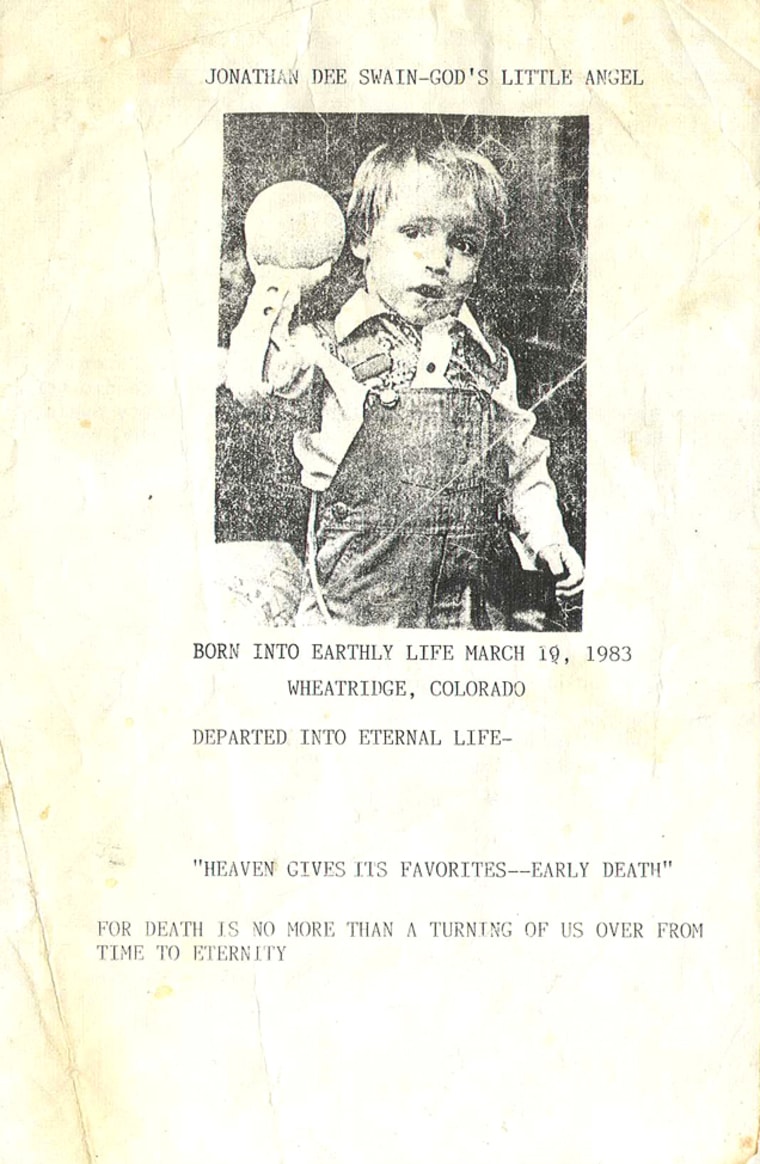
She wrote an obituary for someone who was yet to die. A small black and white photograph of a little boy in overalls, holding a ball, an oxygen tube in his tiny nostrils, his eyes staring quizzically at the camera. “Born into earthly life March 19, 1983,” it said underneath, “Departed into eternal life”... And then a blank space for the date which no one doubted would come soon.
Keith Morrison, Dateline correspondent: Did you tell him he was gonna die?Sheila Swain: Mm-mmh. I wanted to prepare him so he wouldn’t be afraid, you know what I mean?Morrison: But how do you do that?Sheila Swain: I tried to just tell him that he was one of God’s little angels and, you know, that he wasn’t needed very long on this earth.
She had a lot to cope with. Single mother, divorced, a family to raise, including Jon. And now, as she tried to prepare for his death, she discovered that the news had gotten around. The media were knocking on Sheila’s door.
Too bad no one told Sheila “Beware notoriety.” AIDS had produced something like panic. All around Jonathan was a public conditioned by alarming news stories about this fatal disease. How easy was it to catch? Could touching spread AIDS? Or a sneeze?
Sheila Swain: Highly educated people were just acting very ignorant.Morrison: When they saw you coming, you and your boy...Sheila Swain: Oh, they would clear the way, definitely.Morrison: What was the look on their face?Sheila Swain: Fear.
Young Jon was not allowed into the local swimming pool. Two churches barred the entire family from attending Sunday services. And when Sheila prepared that death notice, several funeral parlors told her they wouldn’t accept Jon’s body.
And then there were the threats. Some neighbors wanted them gone. Jon’s brother Josh remembers...
Josh Swain, Jon's older brother: One time a neighbor like across the courtyard actually was threatening physical violence against us, if we didn’t leave.
Josh was just two years older than Jon. And it was hard to understand.
Josh Swain: You don’t understand why you were welcome yesterday and today you’re an outcast. That kinda’ gets you.
Josh vowed, as older brothers often do, to protect Jon from the furor that surrounded him for as long as his short life would allow.
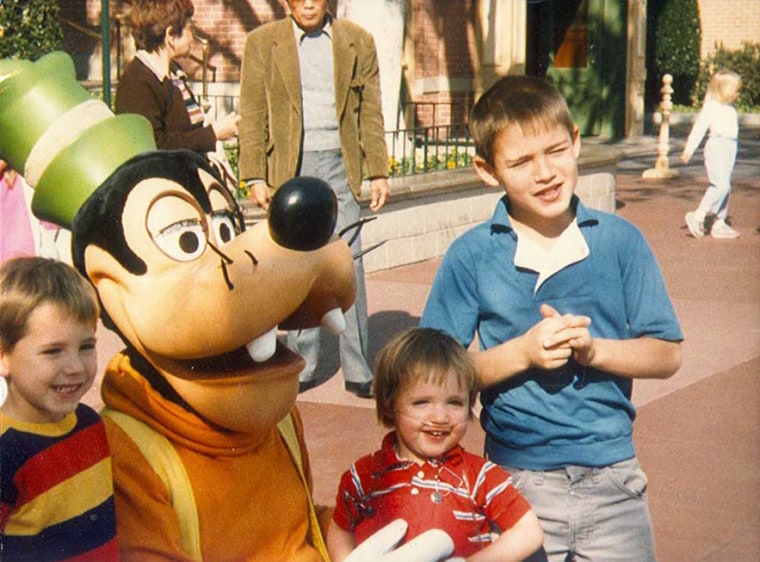
It would turn out to be a little more protection than he imagined. Despite the doctors’ predictions Jon lived to see his third birthday.
Mind you, he was frequently in the hospital, and his health was getting worse.
And yet, he never seemed to lose an unbridled energy. He’d be terribly sick, and yet still bouncing around, with his irresistible grin. He turned four... then five.
And somewhere along the way - as Jon continued to defy the odds - something changed. His mother started to focus not on his death, but his life. Which is why when the local school district refused to enroll Jon in pre-school, shy, reticent Sheila did something she never thought she could do: She spoke up. For her son’s sake, she said, and for other children with AIDS.
She spoke to parents assuring them they had nothing to fear if Jon attended school with their kids. She weathered public rallies, tense school board meetings.
Sheila Swain: My saying was, “It’s you and me against the world.” I was willing to fight the world for him.
And finally, the school board relented. Sheila won! It was a proud day when Sheila accompanied Jon to his first day of school.
Sheila Swain: I’m more nervous than he is. I’ve got the first day jitters myself. Because he’s gotta succeed. He’s gotta do it.
With all that fear, controversy, excitement swirling around him, Jon came to understand his disease and his mother’s heroic battle for him pretty well for a 5-year-old.
In fact, an adult friend helped him write a children’s book that chronicled his brief life. A photo on page 16 showed a mother embracing her son, embracing his life, not his death.
“I love my mom,” the caption read underneath, “I think she is brave. She stood up for me.”
But none of this, life-affirming though it was, could change the fact that Jon, all experts still believed, would lose his life to AIDS in the very near future. No one could have suspected, least of all young Jonathan, that he was soon going to lose his mother as well.
Sheila Swain: I was only one person. I couldn’t do it all and I think I tried to do it all. And...I didn’t succeed.
In March 1989, Jon Swain turned 6 years old.
An event so unlikely, so unexpected, that his party became a media event.
And no one doubted that much of the credit for that—and for Jonathan’s survival this long, was due his mother, Sheila.
Sheila Swain: You know what? I kind of think of my life as pre-diagnosis and post-diagnosis. Everything just pretty much changed after that.
And it wasn't just because of the AIDS.
For a long time, little Jon had been unaware of just how much had changed in his mom’s life.
He didn’t see the gun his mom took out of her drawer just weeks after his 6th birthday; didn’t hear the gunshot that sent a bullet straight into Sheila’s stomach. But he returned home with his brother Josh in time to see the emergency ambulance, horrified to learn his cherished mom might be dead.
Keith Morrison, Dateline correspondent: Why does a woman in your situation with a son who needed so much help decide to kill herself?Sheila Swain, Jon's mother: Well...see, I didn’t really try to kill myself I was thinking about it but I said, “you know what? You could really end things and it, it would solve a lot of your problems but you know, what would it do to the people you love?”
Sheila was lucky. The bullet didn’t hit any vital organs. She told the local news media two weeks later, it was the enormous pressure of caring for Jon that led her to contemplate suicide but that the shooting was an accident.
But at the time of the shooting, dealing with her son’s disease, wasn’t Sheila’s only struggle. A closer look would have revealed the tell-tale signs—the haggard figure, the pockmarked face - a radical change from the strong and pretty woman facing the cameras just a year before.
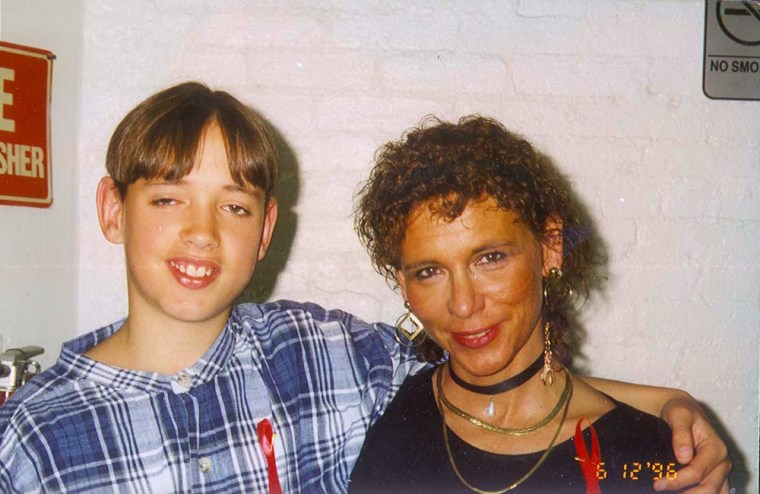
Sheila Swain had an awful secret. And it was a secret that would threaten to destroy not only her, but the son she so desperately wanted to keep alive.
Sheila Swain: Somebody came by and said, offered me... a line of cocaine. You know, just to get my mind away from what I was going through.
One line of cocaine very soon had become a $200 dollar a day crack habit.
Morrison: Did anybody know what was going on out in the outside world?Sheila Swain: No.Morrison: You’re a public figure. Your son’s a public figure. You’re kind of like a hero mom.Sheila Swain: I know.Morrison: But you were becoming a junkie.Sheila Swain: Yeah...sure was.
So, even as she took Jon to the National Institutes of health in Washington for an experimental drug treatment which might help him survive a bit longer, she herself was going down fast.
Life became erratic, unpredictable. They moved when Jon was 7 -- from Colorado to Iowa. And her first stop was a nearby crack house.
If anyone on the outside had known the real story, they would have had to marvel just how did her sick son survive the next year...and the next...and the next.
Neil Willenson, founder of Camp Heartland: What I saw was a young man with tremendous energy and tremendous spirit and great athletic ability.
Neil Willenson, founder of Camp Heartland, a summer camp for children with AIDS, met Jon at the National Institute of Health when Jon was 10 years old.
Willenson: He had a little bit of a temper. He fought with kids sometimes. He certainly knew every swear word in the book. He seemed to be a young man that had lost his innocence at a pretty young age. Jon Swain: I ask myself everyday, why was it me that got AIDS, why was it me? And then I think to myself, well maybe they’ll get a cure one day.
And Neil noticed something else: Jon’s boundless sense of optimism, his insistent belief that he’d beat AIDS... or at least fight it with all his might until the bitter end.
Willenson: He said, “Neil, it’s my goal in life to live to be 20.” It taught me once again that we just don’t have the luxury of time. It reminded me that this seemingly healthy boy that was standing before my eyes was probably going to die in the next few years.
Neil invited Jon to Camp Heartland— to play, to forget even for a little while his daily struggles with AIDS. But he also asked him to talk to children and adults about his disease, to educate, to give them some of the hope that kept him going.
Jon, giving a speech: What I don’t like about AIDS is when people say, “This man in room 37 is dying with AIDS.” You’re not dying until you’re dead. So, you know, always have hope...
Jon’s speeches took him as far away as Japan where the book he co-authored at the age of six had become a best seller.
And there was his mom Sheila, always by his side -- smiling, supportive, the public image of a happy family masking a grim home life that was getting even grimmer.
Josh Swain, Jon's older brother: She stopped being mom. We had welfare, we had food stamps. She’d trade our food stamps for money and then she’d buy crack.
Best he could, older brother Josh, now 13 years old, protected 11-year old Jon as their mother’s drug addiction reached its peak. Sheila binged. Disappeared for days at a time, leaving the boys to fend for themselves.
Josh Swain: We have no food in the house. We’re chewing on spaghetti sticks for chips. We don’t have no pop, no milk. There’s a bunch of alcohol. There’s no food.
Finally Josh had had enough. He left to live with their father. Jon, who had never had a relationship with his dad, didn’t want to go.
Josh Swain: I think that hit Jon pretty hard ‘cause our whole life me and him, you know, we were always together. After I left he didn’t deal. He got worse.
So he did. It was understandable, perhaps, given his mother’s addiction.. But now, without his brother around to support him, Jon’s spirit seemed to give way. And if what he did next was tantamount to suicide, would anyone really care?
Neil Willenson, founder of Camp Heartland and friend: If you think about Jon’s life, I don’t know anyone that suffered more.
In the winter of 1995, Jonathan Swain was losing his life-long battle with AIDS. He had been the consummate fighter; now he was depressed and alone. He’d already lived longer than he should have. Now, surely, he was done.
Jon Swain: I thought about death, but I wouldn’t accept it for me.
But Jonathan Swain is alive here and now, flashing his trademark smile.
Keith Morrison, Dateline correspondent: But you’re supposed to be dead?Jon Swain: Yeah. Crazy, I guess ever since I was a kid, everyone told me I was gonna die and I just always knew deep down inside; I had faith at three years old that I would be alive.
He was alive despite AIDS and despite the abandonment by the person he needed and loved the most.
Jon Swain: Just think about your childhood hero. Would you want to think that your childhood hero was doing drugs?
As he remembered it... the realization came slowly that cocaine had stolen his mother away, that in her desperation to get high, she’d forgotten his needs.
Luckily Jon had his older brother Josh to protect him, not only from the world outside but his own mother, but then Josh left. It was hard, even for a boy as strong as Jon, to withstand the downward spiral of a junkie for very long.
Jon Swain: That’s when it got disastrous. Josh is gone. I’m by myself. There were no escapes at this point. Optimism... there was none.Morrison: Pretty desperate.Jon Swain: Yeah.. Soon there’s a hooker living in the bedroom next to mine—just junkies hanging around the house all the time.
And yet, that was home and this was his situation.
Jon Swain: She said “We’re poor. We’re not getting any help from anyone else. Is it ok if I sell drugs just for a few months, to get us out of this hole?Morrison: She is asking her 11-year-old son for permission to sell drugs from your home?Jon Swain: I just said, “If things are that bad and that’s what you have to do, then that’s what you have to do and I love you.” You know? And I’m ashamed of myself.Morrison: You were a little kid. Jon Swain: I know.Morrison: How can you be ashamed of yourself?Jon Swain: It’s probably the only thing I look back on and I regret.Morrison: But wait a minute… you’re 11 years old!Jon Swain: Right. Yeah, I was only 11 years old. So what can I expect? But I always felt like the protector of my mom and I felt like I didn’t protect her when I did that.
A young child on the verge of death had become his mother’s parent— her nurse, as she flirted with the fatal dangers of her addiction.
Jon Swain: My mom had overdosed and I remember giving her vinegar so she would throw up, so she wouldn’t die and like sticking my finger in her mouth so she would puke. And that was horrible. I think about it and it just hurt.
But in public, Jon revealed no trace of his suffering. Occasionally he and his mother still gave speeches together, and he still attended school... but was afraid to breathe a word of the ugly truth.
Jon Swain: I mean, I couldn’t go in to my teacher and say, “Hey, listen, I live in a crack house. My life is horrible. I have AIDS. I’m sick every day". I knew I would lose my mom. And I didn’t want that. I wanted to be with my mom.
Jon Swain, neglected and depressed, gave up. He stopped taking his AIDS medication. For all those years he had hoped, but now, he didn’t anymore.
Jon Swain: I just said, “Man, I can’t do this.” I was so scared. I was so alone.
But Jon says it felt strange. He wasn’t used to just giving up.
Jon Swain: I said, “You’re telling everyone else you’re not gonna die, but you need to believe it yourself. You need to do something.”
And that’s when a name came into his head: The one adult he could trust.
Neil Willenson, founder of Camp Heartland: It was clear that Jonathan was suffering the worst family dysfunction I had ever heard of.
Neil Willenson, the founder of Camp Heartland, who’d bonded with Jon through all the speeches they’d given together, answered the phone at one o’clock in the morning.
Willenson: He kept asking, “Can I live with you? Can I live with you?”Jon Swain: I said, “I know you don’t know me.” I said, “I know I’m just some kid from your camp. And I know how bad it would look but I have nothing else. I have nothing.”
Neil knew the one thing Jon needed was a stable home. He’d made it his life’s mission to help children with AIDS and here was a real opportunity to make a difference. He said yes.
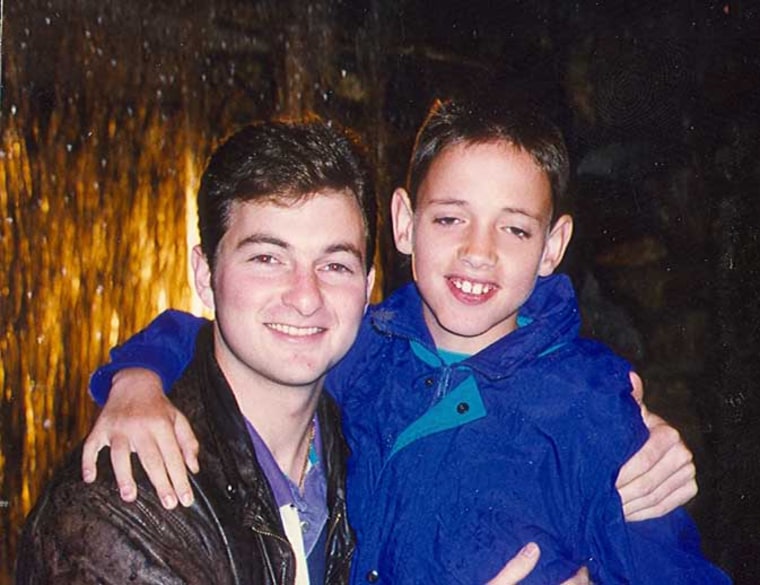
Willenson: I told Jonathan you can come out to live with me here in Milwaukee for two months as long as your mom makes a pledge to use those two months to get clean and sober and then to come and move to Milwaukee, Wisconsin. She made that commitment.
A junkie’s habit is hard to break. Two months turned into two long years.
In mid-1998, Sheila had finally kicked it- no more drugs and a stable job. She had moved to Milwaukee to be near her son in whom her interest was once again insatiable. Jon told Neil she was “mom” again.
Then one day, when Jon was 16, the past caught up. In October 1999, Sheila answered the door to a dozen FBI agents with an arrest warrant for her drug dealing days in Iowa. She could do nothing but plead guilty, she was guilty. In a lifetime of bad days Jon called sentencing day the worst.
It was hard that day to face his mom.
Jon Swain: My whole life I’ve always attacked problems and I’ve always been able to muster up the strength to say, “You know what, I can do this.” That morning I woke up and it was a morning where I didn’t want to do it. I didn’t want to show up for the fight. I was crying. I just told her, “I can’t live like this. I can’t do this. The disappointment is just too much. I can’t deal with it anymore.” Sheila Swain: I felt so bad that day. I mean, to see— because I was sober and clean - and to see the hurt I had caused my family, my kids... my son that needed me, you know.
Sheila Swain was sentenced to 12 years in prison. She’s an inmate at the federal correctional institution in Dublin, California, reflecting on the mother she failed to be.
Morrison: Are you a strong person?Sheila Swain: Uh-uh. I don’t think so. That’s one thing I’m not gonna say I am anymore, "strong."Morrison: Because at the beginning you shouldered it all, you fought the battles.Sheila Swain: And then I wimped out.Morrison: How is it possible that hero mom could get to that place?Sheila Swain: It’s ugly, isn’t it?
Sheila said she’ll now have to find that strength again, if only to overcome the sense of remorse and loss she struggles with every single day behind bars.
Morrison: This causes pain, doesn’t it?Sheila Swain: (Crying) Yeah, it does.
If you think that’s where our story ends...with a crying and incarcerated mother and a devastated son... then you don’t know Jonathan Swain. To be alive longer than almost any other AIDS kid, he had come too far to just be satisfied with survival. Jon wanted more. He’d overcome the worst, and though he didn’t know it yet, the best was just around the corner in the unlikeliest of places.
Who would have believed that the first Colorado AIDS baby would grow up to graduate high school, would still be alive at 18?
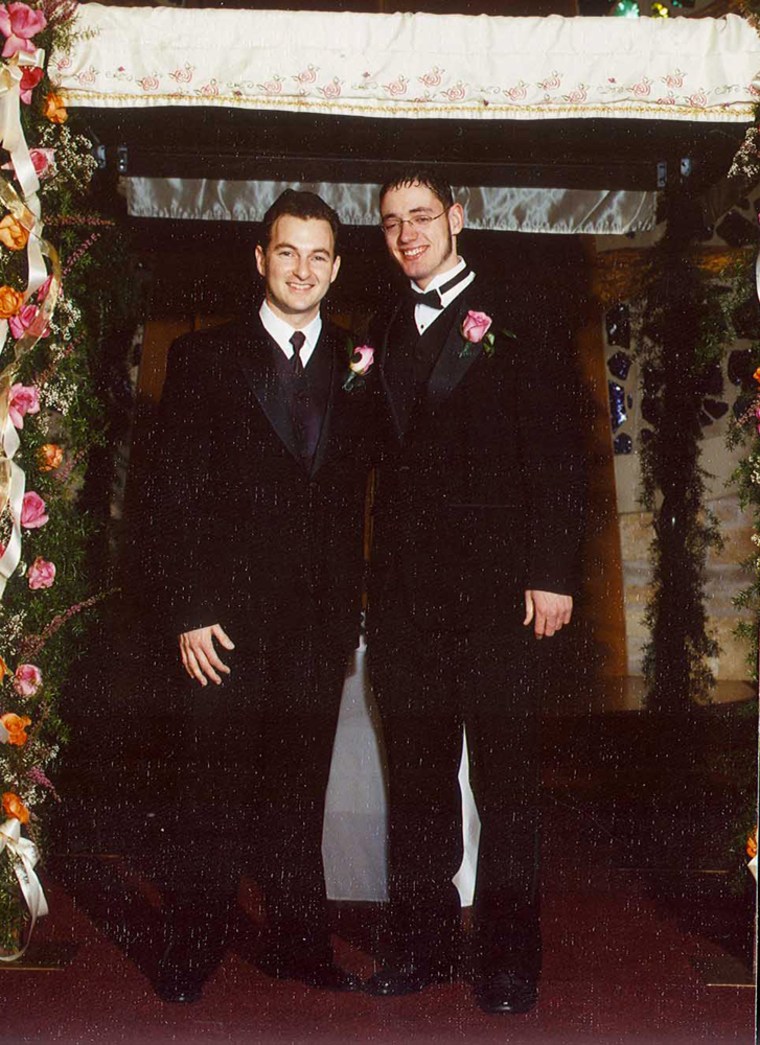
In June 2001, Jonathan Swain was posing for photos with Neil Willenson, the man who’d given him a home these last 5 years, who’d made sure Jon got back on his AIDS medication and began to look after himself again.
His mom was now in prison, serving 12 years for drug-dealing. He might have abandoned her; he didn’t. He went to see her and made a video of his high school graduation just for her.
Jon's videotape for his mom in prison: “How you doing’ mom? I don’t know if you’re going to be able to see this, but I love you. Don’t worry about not being here, it’s alright...”
But inside, he was a very angry young man.
Jon Swain: I will never forget the pain she put me through. It hurts me, what she did to me.
As one of the first pediatric AIDS cases in the U.S., Jon had been fortunate to be at the forefront of AIDS research, and lived long enough to benefit from a medical breakthrough in the mid-'90s... a mixture of drugs called pro-tease inhibitors which, though they do not cure AIDS victims, did manage to prolong life, quite dramatically. For Jon there was a new question: What to do next?
The future was a strange and unsettling concept for Jonathan Swain, but he knew there was someone who could help him figure it out— his older brother Josh.
Jon Swain: I always felt a sense of security when I was around Josh. I’ve always felt like things were gonna be alright.
Josh, now a cook, lived in a small town called Vernal, Utah. Was Jon ready to leave the understanding world around him, ready to face possible discrimination, to fight for acceptance one more time? Was Jon ready for Vernal, Utah? People who knew Jon asked a different question: Was Vernal ready for him?
Jon, in a way only Jon could, wasted no time in making his presence known.
He was back with his brother again, weathering the storm — this time of food orders — side by side, just like old times.
And then, the most unexpected thing: Jon met a girl.
Her name is Amber. She was a waitress at the restaurant. She liked Jon. And Jon liked her.
Jon Swain: I guess I’m attracted to people that are very compassionate, very empathetic and understanding. I guess I kind of need that in order for it to work, you know? You gotta be compassionate and understanding to accept me and my situation.
Jon had always been upfront about his disease. With girls that usually meant the end of any romantic relationship, but not with Amber.
Jon Swain: I almost thought she was crazy, honestly. She didn’t care at all.Keith Morrison, Dateline correspondent: She didn’t care that you had AIDS?Jon Swain: She cared but she wasn’t worried.
Who was this 22-year old woman who wasn’t worried about AIDS? Amber came from a tight-knit Mormon family. She had two little kids. She was separated, soon to be divorced. She was bright, rebellious... and in love.
Morrison: How can you commit to having a relationship physically with a guy you know has AIDS? How can you do that?Amber: Well, there’s no guarantee. I could die in an airplane crash or to work in the car tomorrow. I mean, it’s not fair to him to not have somebody that loves him just ‘cause he got it when he was a baby.Morrison: But you could get AIDS...and you’re prepared to accept it as a consequence?Amber: I have to if I’m gonna be with him. I mean, every time we have sex, it’s a possibility that I can get it.
Jon used a condom to minimize any chance of infecting Amber with HIV, the virus that causes AIDS. Still, when Amber told her parents about Jon, they warned her: she was playing Russian roulette.
Jon Swain: They always asked me the question, “If you love Amber as much as you do, why would you put her at this risk?” I just told them that I’m a progressive person and I’ve never let AIDS define who I was. I want to have things in life and I’m sorry it happens to be your daughter.
Amber’s family objected again when Jon and Amber told them they intended to move in together. Jon got worried.
Jon Swain: I was scared that her family would never accept me and I didn’t want to take that away from your family.Amber: But I also told you that I’d give up my family if that’s what it meant.Jon Swain: I know.Morrison: You would give up your family? For him?Amber: Yeah. (Crying). Jon Swain: That’s what was so hard for me... (Jon sees Amber’s tears, stops and kisses her.)
But remember... nothing had ever come easily to Jon Swain.
It may have been inevitable that despite all his precautions, one terrible day, the statistical probabilities of that Russian roulette of theirs played out: The condom broke.
Jon Swain: It was very scary for me. I almost had a nervous breakdown. It was like, “My God, my God, you know. I just gave you AIDS.” I felt so bad. I felt so responsible.Morrison: Yeah. You have taken this woman who loves you and who you love, and maybe you’ve given her a death sentence.Jon Swain: Exactly.
Without delay, Amber submitted to an HIV test and though she claimed she was prepared for whatever it might tell - these were nerve-wrecking days. Already, as she waited for the results, she began to feel different: Fatigued, occasionally ill.
And then, alone in the bathroom, she was caught off guard looking at two bright blue lines: the result of a different test altogether. Amber was pregnant.
Amber: I was excited, but nervous. At that point, all we knew is that if I got pregnant I would get AIDS.Jon Swain: I, Mr. AIDS here, I called the AIDS hotline and I said “Is it possible to be pregnant and not have AIDS? They said, “Yes.” And I was holding on to that.
Amber’s first test came back negative, but HIV is notorious for taking its time. Amber needed to get tested every month and if she had it, there was a chance her baby could have it too.
Jonathan Swain — a father? Not in his wildest dreams, he said.
Jon Swain: I would always shut it out of my mind. I wasn’t sure... Morrison: Afraid to hope.Jon Swain: Yeah. I didn’t want my hopes to get down. It happened too much in my life to get my hopes up and be let down.
The next months were difficult. Highs and lows. The wondrous ultrasound image of their baby. The moments when pessimism ruled, when fear took over.
Jon Swain: Every night when I said my prayers, when we didn’t know if Amber had AIDS or not, I told God, “I promise I won’t take this for granted, just give me this opportunity. Please don’t let them get AIDS.
Amber continued to take the HIV test and each time it came back negative.
On June 6, 2004, when Amber was eight months pregnant, she and Jon got married. Amber’s parents attended the ceremony, finally ready to embrace Jon as one of their own.
Then, six weeks later, on July 27th, 2004, it was time.
Jon and Amber were in the delivery room. Jon was there, of course. He was nervous and almost dazed, in utter amazement that this was happening to him at all.
Jon watched open-mouthed as the baby appeared, cut umbilical chord, and handed the baby to Amber.
Just like that, the boy who was never supposed to live, was now a father to a son to "Jett Davis Swain."
They tested Jett as soon as he was born and there was no HIV. Jett was healthy.
Jon Swain: I can’t really put into words. I’m just so happy. I should have been dead long ago. Everyone thought I would be I always knew I would be here, I never knew I would be here. That’s why I think it’s a miracle. Jon Swain [looking at Amber]: I love you. I’m just glad that you gave me this opportunity. I’m just very proud of you, proud of Jett.
Sheila Swain gets the news in her California prison cell. She’s a grandmother. Another milestone missed. But she had news too, of her own. It might soon bring the whole story to its remarkable conclusion.
Jonathan Swain was not so sure that the bond he once felt with his mother had survived all those years of abandonment, betrayal and lies... all those disappointments. He had stayed in touch with Sheila during her time in prison, but the years of pain and neglect during her addictions had left their mark.
Jon Swain: In some ways, it’s kind of messed me up. It’s hard for me emotionally sometimes. It’s hard for me to forgive people sometimes, I think, because of what happened.
Anyway, he was a husband now... and a father, who wanted to be there for his son… always, and not just the first few years, the way his mother was for him.
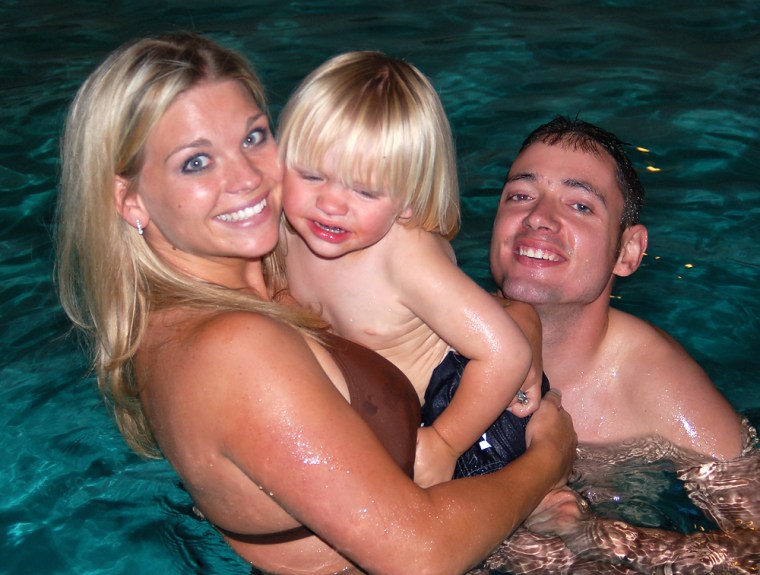
And there was the big news. His mom was about to be released after more than 5 years in prison, which meant that Jon had a decision to make. Could he accept her back in his life? After all she had done? From her prison cell, Sheila — off drugs for seven years now — asked for his forgiveness.
Sheila Swain: I’m very ashamed of what I did, you know, very ashamed.Keith [to Sheila in prison]: He says no one hurt him more than you. Is there anything you can do to make that up?Sheila Swain: I don’t know. I’m gonna do my best to try. I can’t go back; I can’t change what’s been done. I can only move on. I can only move forward.
Jon hoped the person who would leave prison in a couple of weeks would be the mom who, when he was little, so long ago, was there for him...
Jon Swain: She’s a really very good-hearted woman. I never doubted in my mind that she loved me.Morrison: Do you forgive her?Jon Swain: Do I forgive her? I forgive my mom. I just will never forget how bad she hurt me.
Now Jon made the decision he believed was right. He told his mother she has a place with him in his new home with his family here in Vernal, Utah.
Morrison: He says he never once doubted that you loved him, never doubted your compassion, never doubted that you cared about him.Sheila Swain: I don’t deserve him, you know, I really don’t. He’s so amazing. I am so proud of him and honored to be his mother. I am so thankful for a second chance.
But would he be a pushover? An enabler? Not Jon Swain.
Jon Swain: I said, “If I ever find drugs or if you’re ever stranded in a crack house, it’s over. You’re out, it’s done." That would be very hard for me but I can’t; I will not put my son and my wife through what I went through. Sheila Swain: He keeps saying, “If you ever do drugs again.” I know, I’m probably gonna have to be proving it to him for a long, long time. Morrison: Probably for the rest of your life.Sheila Swain: Probably.(Airport reunion)Jon Swain: I’m very nervous. It must mean she’s coming down the escalator.Amber Swain: You’re nervous?Jon Swain: Yeah, all of a sudden.
And now here it is. January 4th, 2005: A son waiting to be reunited with his long-lost mom. He has a wife and a six-month old grandson to show her.
Jon sees Sheila at the airport.Jon Swain: There she is.Jon waves and Sheila approaches. Jon hugs her tightly with Jett.Jon Swain: How are you mom? I love you.Sheila hugs Amber, puts her face close-up to grandson Jett. Jon Swain (on camera): She’s lucky because she does have the chance to redeem herself. She has a chance to be a good grandmother. She has a chance to be a good mentor for me. To be someone to talk to, to be there for me. She has that opportunity now.Sheila Swain: It is a new beginning. It’s just like a clean slate. I’m his mother and I want to be a mother that he can count on.Jon Swain: I believe in her more than I ever have in my whole life. I want to be there for her to help her in any way I can.Sheila Swain: Ahh...I am not gonna let him down! I am not gonna let him down. Did you just hear what he said about me? Ahh!
Once, his crazy dream was to live to be 20.
Now, at 22, Jon knows that his AIDS can still kill him at any time, which is why he’s religious about taking his medication and watching his diet. He says he now has incentive to live 60 more years.
His mother is back. His brother, who’d helped him survive as a boy, is now his cooking partner. His son, Jett, is healthy.
And Amber... well, who could ever have expected to find her?
Morrison: What do you hope for Jett and for your family now?Amber Swain: I hope that Jon’s around to see him grow up.Morrison: Do you have any doubts about that?Amber Swain: Some, but I knew that going in. I don’t think he will. He better not.Jon [laughing]: Or you’ll kill me, right?Amber Swain: That’s right.Jon Swain: Yeah. I don’t have any doubts. Honestly. I don’t. I want to live a long life. I wanna be there for my family. I wanna beat this virus. I’m going to beat it.
Amber and Jett remain HIV-free. Sheila is still off drugs and ready to go back to work. And Jonathan is also doing well. Recently the Swains took their first family vacation to DisneyWorld.
